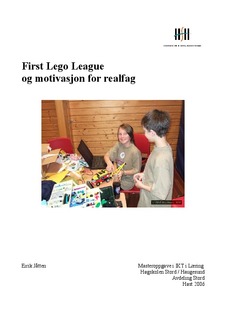| dc.description.abstract | Abstract
”The science subjects are in a crisis” is a heading that one could find in the press on a daily
basis. The application numbers to the science degrees at the majority of the universities and
colleges shows this negative development. Today one finds many different explanations for
why this has taken place within the school system. Nevertheless, one thing remains certain -an
attitude change among the pupils is due in order to change the situation.
First Lego League is an international technology competition for teenagers between 11 and 16
years. It started in 1998 through collaboration between no-profit organisations FIRST, MIT
and the Danish large concern Lego. The competition spread to Scandinavia as early as 1999
and the first Scandinavian final was held in Bodø the same year. Today the competition is held
in a total of 26 countries, divided across all the continents. From the somewhat slender start in
1998 with its 1 600 participants, the competition has grown to 60 000 teenagers divided into a
total of 7 460 teams in 2005.
The competition is divided into several phases and has various requirements for the teams.
The assignment is made public in the middle of September every year. The team then has 8
weeks to solve the assignment and each region selects its winner in a regional competition.
A descriptive research design with survey and interviews as practical methods was chosen to
look into the problem field. A total of 103 people participated in the survey investigation,
while 8 were interviewed.
The research questions witch the theory and the methods tries to find an answer to are:
1) Is FLL suitable to increase the motivation for science among pupils in secondary
school?
2) Does the attitude towards science change through participation in the FLL?
3) Does gender matters?
4) Does FLL potentially increase the number of science-pupils?The research concludes that:
- The motivation for science subjects increases short after (half a year) after
participation in the First Lego League competition.
- The interviews indicate a longer effect, but the numbers of interviews are too
few to make certain conclusions.
- The effect seems to be greater for girls than for boys.
- Participants in FLL are more likely to have mathematics as their favourite
subject compared with the reference group.
- Do FLL give more science students? The research data indicates a increase in
the number of science students among former FLL participants compared with
national average
- If the result from my research is compared with conclusion in the IMPACT
report, you will find much of the same tendency. | en |
